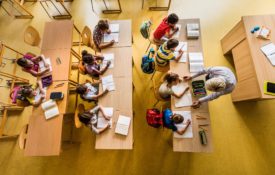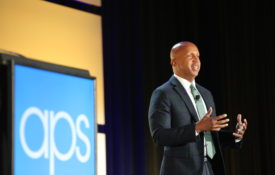-

Mix It Up: Testing Students on Unrelated Concepts Can Help Jump-Start Learning
Unlike traditional “blocked” testing, which requires students to retrieve information about a single topic, interleaved testing presents a mix of topics from various lessons in order to encourage deeper conceptual learning.
-

Building a Better, More Just Society Through Psychological Science: APS 2022 Opens
Equal Justice Institute’s Bryan Stevenson delivers opening keynote as 2,500 psychological scientists convene in Chicago.
-
Mindfulness Hurts. That’s Why It Works.
Some years ago, a friend told me that his marriage was suffering because he was on the road so much for work. I started counseling him on how to fix things—to move more meetings online, to make do with less money. But no matter what I suggested, he always had a counterargument for why it was impossible. Finally, it dawned on me: His issue wasn’t a logistics or work-management problem. It was a home problem. As he ultimately acknowledged, he didn’t like being there, but he was unwilling to confront the real source of his troubles. Many of us, even if we don’t travel for work, do something similar by avoiding spending time in the home of our own mind.
-
On the Phone, Alone
Many measures of adolescent mental health began to deteriorate sometime around 2009. It is true of the number of U.S. high-school students who say they feel persistently sad or hopeless. It’s also true of reported loneliness. And it is true of emergency room visits for self-harm among Americans ages 10 to 19. This timing is suspicious because internet use among adolescents was also starting to soar during the same period. Apple began selling the iPhone in 2007. Facebook opened itself for general use in late 2006, and one-third of Americans were using it by 2009.
-

Virtual News Briefings at APS 2022 Convention
Journalists are invited to attend two virtual media briefings during the 2022 APS Annual Convention.
-

New Report Finds “Gaps and Variation” in Behavioral Science at NIH
A new NIH report emphasizes the importance of behavioral science in improving health, observes that support for these sciences at NIH is unevenly distributed, and makes recommendations for how to improve their support at the agency.

